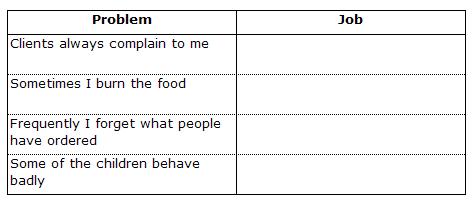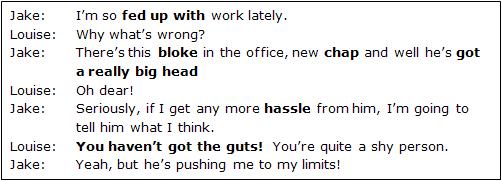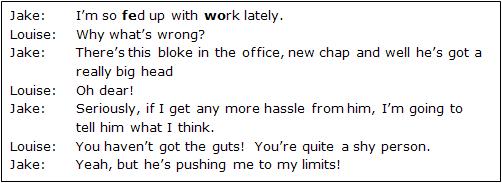British Slang – Problems at work
1.- Introduction
In today’s lesson, you are going to be introduced to new slang expressions related to problems at work. By the end of the lesson, we hope you are going to be able to use the new expressions in context.
A. Look at the list of problems people have with their jobs. Match them to the jobs where they can be found
- Customer services representative
- Teacher
- Waiter
- Chef
(En todas las preguntas, para ver respuesta hacer doble click en recuadro; un click vuelve a recuadro original)

2.- Pre-Listening Task
It’s Wednesday evening. Jake and his girlfriend Louise are at a bar having a drink. They start a conversation about their jobs. Jake is an office manager and he is having a problem with one of his employees.
A. Before you listen, what do you think Jake will say? Imagine the conversation out loud.
________________________________________
________________________________________
________________________________________
3.- Listening
[Objeto Flash Eliminado] Sonido
A. Listen. Which two of the next adjectives describe how Jake is feeling?
happy / stressed / excited / exhausted / annoyed
shocked / frustrated / sad
| 1) | ||
Corregir
Ver Solución
Limpiar | ||
B. Listen again and answer the following questions:
| 1) | Why ins´t Jake happy with work at the moment? | |
| 2) | What is Jake going to do if the situation continues? | |
| 3) | What kind of person does Louise consider Jake to be? | |
Corregir
Ver Solución
Limpiar | ||
C. Listen again and complete the following sentences with the words from the dialogue.
| 1) | I´m so with work lately. | |
| 2) | There´s this bloke , new chap and well he´s . | |
| 3) | You´re quite a . | |
| 4) | Yeah, but he´s to my limits. | |
Corregir
Ver Solución
Limpiar | ||
Check your answers!
4.- Focus on Vocabulary
A. Read the dialogue and find words/phrases in the text that mean:
(En todas las preguntas, para ver respuesta hacer doble click en recuadro; un click vuelve a recuadro original)

Audio Script: Problems at work

B. Complete the following sentences with one of the words/phrases in bold from the dialogue. If necessary change the form/tense of the verb.
| 1) | Julie has started going out with this from her dance class. | |
| 2) | Katie was so the weather in England, she decided to move to Spain. | |
| 3) | Although Paul is good looking, he knows it and he . | |
| 4) | He his mum all the time because he wants her to give him more pocket money! | |
Corregir
Ver Solución
Limpiar | ||
5.- Focus on pronunciation and intonation
A. Listen again to the dialogue. This time, mark the primary and if applicable, secondary stress in each sentence. For example:
(En todas las preguntas, para ver respuesta hacer doble click en recuadro; un click vuelve a recuadro original)

Check your answers.
Now practice saying the dialogue with the correct pronunciation and intonation.
If necessary, listen again and repeat.
6.- Speaking Activity
Now we have learnt some British slang, let’s use it!
The situation is:
You go out for lunch with a work colleague (your teacher) and she tells you about the problem she has with her boss.
Partner B (YOU): listen carefully to your teacher and offer her a solution to her problem. Make sure you use some of the new expressions from today’s lesson!
When you are ready, play the video of your teacher and give her solutions to her problem.
Then try and play the role of the teacher. Imagine that your boss is annoying you. Prepare a short dialogue and practice it.
Audio Script
I hope you can help me. I really don’t know what to do. It’s my boss. She’s pushing me to my limits.
Every day I am supposed to finish work at five o’clock but at quarter to five my boss always comes to see me and hassles me. She asks me what I have done and then tells me she wants me to type a letter or write a report or prepare a presentation. I never leave at five o’clock, it’s usually six or seven o’clock.
I think I’m going to tell her what I think of her!

